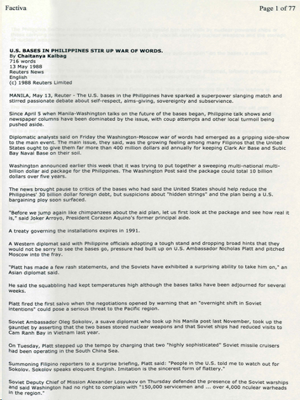U.S. BASES IN PHILIPPINES STIR UP WAR OF WORDS
[Reuters]
Published date: 13th May 1988
13 May 1988
Reuters News
English
(c) 1988 Reuters Limited
MANILA, May 13, Reuter – The U.S. bases in the Philippines have sparked a superpower slanging match and stirred passionate debate about self-respect, alms-giving, sovereignty and subservience.
Since April 5 when Manila-Washington talks on the future of the bases began, Philippine talk shows and newspaper columns have been dominated by the issue, with coup attempts and other local turmoil being pushed aside.
Diplomatic analysts said on Friday the Washington-Moscow war of words had emerged as a gripping side-show to the main event. The main issue, they said, was the growing feeling among many Filipinos that the United States ought to give them far more than 400 million dollars aid annually for keeping Clark Air Base and Subic Bay Naval Base on their soil.
Washington announced earlier this week that it was trying to put together a sweeping multi-national multi billion dollar aid package for the Philippines. The Washington Post said the package could total 10 billion dollars over five years.
The news brought pause to critics of the bases who had said the United States should help reduce the Philippines’ 30 billion dollar foreign debt, but suspicions about “hidden strings” and the plan being a U.S. bargaining ploy soon surfaced.
“Before we jump again like chimpanzees about the aid plan, let us first look at the package and see how real it is,” said Joker Arroyo, President Corazon Aquino’s former principal aide.
A treaty governing the installations expires in 1991.
A Western diplomat said with Philippine officials adopting a tough stand and dropping broad hints that they would not be sorry to see the bases go, pressure had built up on U.S. Ambassador Nicholas Platt and pitched Moscow into the fray.
“Platt has made a few rash statements, and the Soviets have exhibited a surprising ability to take him on,” an Asian diplomat said.
He said the squabbling had kept temperatures high although the bases talks have been adjourned for several weeks.
Platt fired the first salvo when the negotiations opened by warning that an “overnight shift in Soviet intentions” could pose a serious threat to the Pacific region.
Soviet Ambassador Oleg Sokolov, a suave diplomat who took up his Manila post last November, took up the gauntlet by asserting that the two bases stored nuclear weapons and that Soviet ships had reduced visits to Cam Ranh Bay in Vietnam last year.
On Tuesday, Platt stepped up the tempo by charging that two “highly sophisticated” Soviet missile cruisers had been operating in the South China Sea.
Summoning Filipino reporters to a surprise briefing, Platt said: “People in the U.S. told me to watch out for Sokolov. Sokolov speaks eloquent English. Imitation is the sincerest form of flattery.”
Soviet Deputy Chief of Mission Alexander Losyukov on Thursday defended the presence of the Soviet warships and said Washington had no right to complain with “150,000 servicemen and … over 4,000 nculear warheads in the region.”
A European diplomat said the U.S. aid package had clearly thrown Manila off its stride in the bases debate.
The Philippine Senate is considering a sweeping bill that would ban port calls by nuclear-powered ships or those carrying nuclear weapons, overflights or landings by aircraft carrying nuclear weapons and the storage of nuclear weapons.
Aquino urged leading senators on Monday to “help me keep my options open” on the bases, a remark interpreted to mean she had been embarrassed by the bill.
Despite assertions by the United States that the aid package had no strings attached, leftwing groups have loudly attacked the proposal, charging it was a thinly veiled pressuring tactic.
Respected Manila Chronicle columnist Amando Doronila said “the question facing the Filipino leaders is whether it is possible at all to separate the aid plan from the bases question.”
The independent newspaper Malaya put the dilemma more bluntly, charging that through the aid plan Washington had gathered “a lot of small sticks and bundled them into a club the better to bludgeon” the Philippines into submission.
“It is a pity the Philippine government, with its long history of mendicancy, has not learned even the most elementary principle of such art,” the newspaper said in an editorial.






